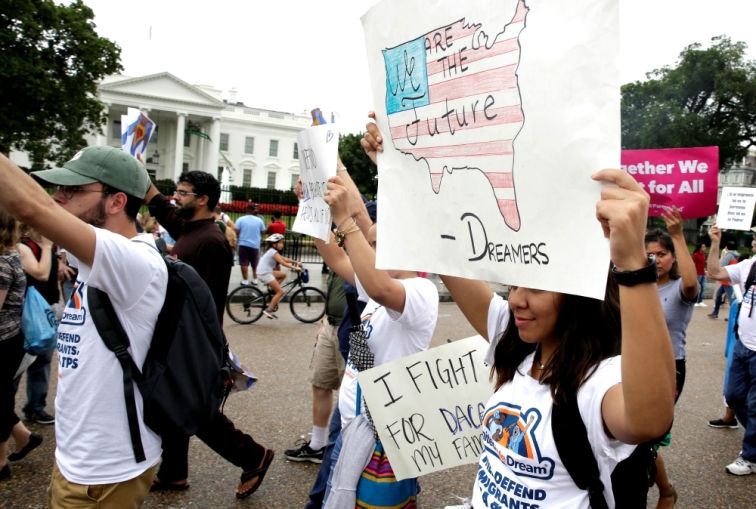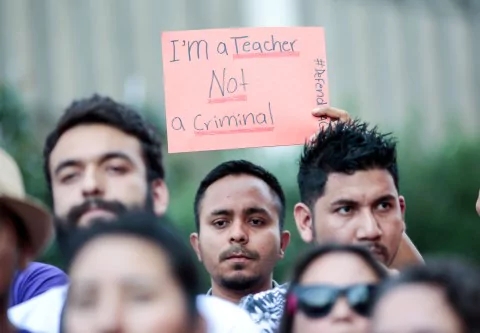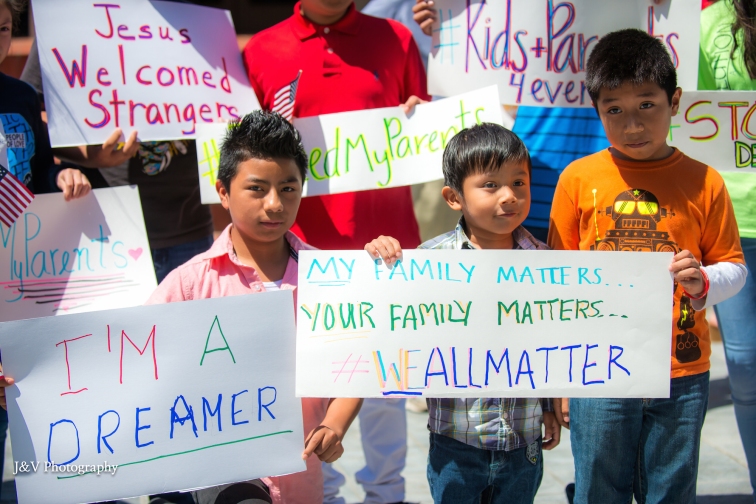
DISCLAIMER: I am not a reporter nor a writer nor pretend to be one. I do not enjoy nor feel compelled to share political views, and I feel that such discussions tend to lead to division more than unity. However, I feel I cannot sit by silently in this issue. This is an attempt to bring awareness (and hopefully action thereafter) to a critical social issue. I cannot withdraw my bias, but I am trying to be fair and civil.
A Little Background
While resting on the couch after a day on the road, my wife nudged me to look at an article on her phone. Per reports, President Donald Trump has decided to end DACA (Deferred Action for Child Arrivals), the executive order from the Barack Obama administration that allowed undocumented immigrants who were brought into the United States as children to receive work permits and to apply to colleges pending a vetting process, monetary fees, and routine check-ins with the government. (Read more about what DACA is here) (Read the initial report by Politico here)
We weren’t too surprised, but we were shocked nonetheless. Several attorney generals across the country have threatened litigation against DACA, and though Trump has shown sympathy towards DREAMERS, he finds himself boxed in according to an interesting read by The Atlantic. To be fair, the collection of AG’s claim their objections stem from the overreach of the Obama presidency and feel that he abused his authority in the founding of DACA. From a legal regard, they appear to be correct. At least one of these AG’s, Tennessee’s Herbert Slatery, has dropped out of the pursuit of litigation and now shows support for a Congress lead initiative to address the DACA program. You can read his letter here.
However, it appears from all accounts that the DREAMERS’ future depends upon the actions of Congress, a position I would never want to find myself in.
Character Witness
From a personal standpoint, this move towards ending DACA strikes a chord, because I have had the honor of meeting several DACA recipients. I have heard their stories. They moved to the U.S. with their parents as children, grew up with an American education, played in the school’s marching band, played on the football team, and were Americans. I have read about Jesus Contreras, a young DREAMER risking his life to rescue Americans in Hurricane Harvey, and Alonso Guillen who died doing the same thing. My bias is quite evident at the moment, but I consider myself an advocate for this group of nearly 800,000 individuals.

Support for DACA
And I’m not alone. Many Christian Evangelical Leaders (including Trump’s Evangelical Advisory Board) have spoken up in support of DACA. Russell Moore, President of the Southern Baptist Convention, is a good example.
Children shouldn’t suffer because of the decisions of their parents, especially when they have tried to make things right. #DACA
— Russell Moore (@drmoore) August 31, 2017
Others who have spoken up in support of DACA include Republican senators Paul Ryan (WI), Jeff Flake (AZ), Marco Rubio (FL), Jeff Lankford (OK), Lindsey Graham (SC), and Orrin Hatch (UT). Conservative voices such as Jeb Bush
Obama’s immig EOs were unconstitutional, but it would also be unconscionable to repeal DACA w/out leg solution https://t.co/XOCTatR3Kh
— Jeb Bush (@JebBush) September 1, 2017
and Evan McMullin
Punishing people for their parents’ violations undermines our nation of laws and serves only injustice.
— Evan McMullin (@Evan_McMullin) September 2, 2017
have also spoken out in defense of DACA.
Over 400 business leaders have also signed a letter to President Trump asking that DACA be upheld. According to American Progress, 72% of Fortune 500 companies have hired DACA recipients.
Why Can’t They Just Go Home?
In the social media age, it is not difficult to find discouraging responses to virtually any topic. Of course, DACA is no exception. The rebuttals to DREAMERS that I have seen are:
- Why haven’t they become legal already?
There has been no pathway to a legal status for these people with very rare exceptions (political asylum, etc). In fact, those approved by the DACA program have jumped on the only shadow of a chance (besides marriage to a U.S. citizen) afforded to them. By willingly going to the U.S. government and sharing their personal information, these people are making an attempt to make things right.
- Why can’t they just go home?
I was born in Morristown, TN. We moved when I was four years old, and after a short stent in Texas, I spent the majority of my life in north Mississippi. How should I answer when people ask where I am from? I always answer Mississippi. I know nothing of Morristown except for a few blurry memories. If the government, for some reason, banished me from Mississippi sending me back to Tennessee. It would be traumatizing. I would lose my job, house, etc, but at least I would still be in a familiar environment.
For these DREAMERS, “home” is America… the land that may forsake them. Many of them have never returned to their country of origin, and a lot of them do not know that country. Sending these people away is not a deportation; it is an exile.For some perspective, Juan Escalante, a DREAMER born in Venezuela, shared what the time is like for DREAMERs via a particularly honest twitter thread.
What it feels like to be a Dreamer at this particular point in time.
A 101 guide
— Juan Escalante (@JuanSaaa) September 4, 2017
- They broke the law! We are a nation of laws.
This is true. Even though in my opinion, it is illogical that people are to be punished for growing up in our country unauthorized, a law was broken. I think the argument that many are making, including many lawmakers, is that the punishment does not fit the crime.But on the other hand, if I earn a speeding ticket, I think we would all agree my son in the backseat shouldn’t receive one.
- They’re a drain on the economy. (Also, they just want to get on government assistance.)
According to statistics conducted by American Progress, 97% of DACA recipients are either employed or enrolled in school. Also, 5% have started their own business compared to 3.1% of the general public. Research has shown that DACA recipients are estimated to account for $460.3 billion over the next decade. There are a lot of more interesting statistics along these lines here.
- We can’t just give amnesty!
Amnesty is defined to be “a pardon extended by the government to a group of people, usually for political offenses.” No one is asking for a pardon. DACA recipients have already shown that they’re willing to pay. They just want an opportunity.
As an aside, Ronald Reagan did grant amnesty. In fact, his response and that of George H. W. Bush in 1980 to illegal immigration is strikingly relevant today (watch).

A Christian Response
In these tough political times, I often ask myself what the appropriate Christian response should be. I don’t confess to know all of the answers, but I believe it’s becoming increasingly clear that there is a difference between the Church and the Evangelical Demographic. I believe it is wise to question whether our ideas match up with the Bible’s teachings. The Bereans were commended for doing so in Acts 17: 10-15. With that said, all I can provide is A Christian response to DACA, as I am not in authority to speak on behalf of all Christians.
The Scriptures are full of advice regarding the treatment of foreigners. Passages such as “You shall treat the stranger who sojourns with you as the native among you and you shall love him as yourself, for you were strangers in the land of Egypt: I am the Lord your God” (Leviticus 19:34), and “Do not oppress the widow, the fatherless, the sojourner, or the poor, and let none of you devise evil against another in your heart” (Zechariah 7:10).
Jesus made God’s stance on addressing the needy pretty clear in In Matthew 25:34-40.
“Then the King will say to those on his right, ‘Come, you who are blessed by my Father; take your inheritance, the kingdom prepared for you since the creation of the world. For I was hungry and you gave me something to eat, I was thirsty and you gave me something to drink, I was a stranger and you invited me in, I needed clothes and you clothed me, I was sick and you looked after me, I was in prison and you came to visit me.’
“Then the righteous will answer him, ‘Lord, when did we see you hungry and feed you, or thirsty and give you something to drink? When did we see you a stranger and invite you in, or needing clothes and clothe you? When did we see you sick or in prison and go to visit you?’
“The King will reply, ‘Truly I tell you, whatever you did for one of the least of these brothers and sisters of mine, you did for me.’
Even to those caught in the wrong, Jesus preferred compassion over judgement. John 8:1-11 tells a story of Pharisees bringing a woman caught in the act of adultery to the feet of Jesus. “Now in the Law, Moses commanded us to stone such women; what then do You say? (John 8:5)” Jesus’s now famous reply inviting the sinless to begin the stoning drove away those wanting to stone the sinner. “Straightening up (from kneeling down), Jesus said to her, ‘Woman, where are they? Did no one condemn you?’ She said, ‘No one, Lord.’ And Jesus said, ‘I do not condemn you, either. Go. From now on sin no more.’ (John 8:10-11)”
The letter of the law demanded that this woman should be stoned, but Jesus insisted on compassion. We, as a nation, now have the chance to do the same. The crime committed is having moved to our wonderful country as a child. How can we not react with compassion? How can we not say, “I do not condemn you either.”
Many Christians pride themselves on being Pro-life, but I believe that many really mean Pro-birth. Christians have advocated for the lives of the unborn (something to be commended), but we cannot leave it there. People are hurting and in terrible situations, and the Church is called to meet those needs. This fits a variety of contexts, and the DACA recipients are a perfect example.
What Can We Do?
If you are convinced that the DREAMERS deserve a chance to live out the American dream, then advocate for them.
Firstly, pray that our country’s leaders would work together in a bipartisan effort to pass immigration reform (something that has stalled since the presidency of George W. Bush). If Congress passes a way for DREAMERS to stay in this country and work legally, then DACA recipients will better off than they ever have. If they do not, we may see deportations of the exact kind of people we want to attract to our country.
Secondly, show public support. If you’re like me, you do not like posting political opinions on social media, but there are times that call for us to say something. Congress is designed to reflect the desires of constituents, and united voices can make a difference.
Thirdly, contact your Senators and Representatives. You can find contact information for your senators here and representatives here. Call them. E-mail them. Write letters. Repeat the process. Matthew 18 tells of the unjust judge who begrudgingly ruled in favor of a widow because of her insistent requests. (Update: according to this article, calling your congressmen is much more effective than letters.)
Prologue
I know that this poorly written essay will not convince everyone. Some may feel righteous in denying DACA recipients, but if you do empathize with these people then HELP in any way you can. This is a chance for America to show that we can work together. We can overcome political divides.
And if you’re a Christian, we can live out the gospel’s call. “For the whole Law is fulfilled in one word, in the statement, ‘You shall love your neighbor as yourself’” (Galatians 5:14). Interestingly, when Jesus was confronted with the question, “Who is our neighbor?”, He responded with a parable of The Good Samaritan. For the Jews of Jesus’ time, the Samaritans were a group people from outside their own culture. I believe that fits our discussion.

